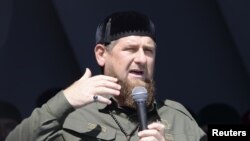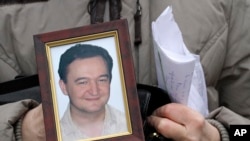Russia said Thursday new U.S. sanctions against five Russians, including Chechen strongman Ramzan Kadyrov, are "illegal and unfriendly."
Kremlin spokesman Dmitry Peskov said Russia is likely to reciprocate.
The U.S. Treasury Department on Wednesday accused Kadyrov of carrying out deadly repression against people trying to expose government corruption.
It said Kadyrov "oversees an administration involved in disappearances and extra-judicial killings,” while the State Department said he played a significant role in torture carried out against the LGBT community in Chechnya.
“One of Kadyrov’s political opponents was believed to have been murdered at Kadyrov’s direction, after making allegations of torture and ill-treatment taking place in Chechnya, including alleged torture carried out by Kadyrov personally,” the Treasury Department said.
The U.S. sanctions block the five individuals from conducting any financial transactions in the United States and also generally prohibits any Americans from doing business with them.
In addition to Kadyrov, the United States accused Ayub Kataev, a prison warden and head of a branch of the Chechen internal affairs ministry, of extrajudicial killings and other human rights violations, including abuse of gay men.
The United States also alleged that three others, Alexei Sheshenya, Yulia Mayorova and Andrei Pavlov, were involved in the $230 million tax fraud conspiracy uncovered by attorney Sergei Magnitsky at the Russia-based Hermitage Fund.
The U.S. action came under its 2012 law named after Magnitsky, who after exposing the Hermitage fraud was subjected to physical and mental abuse while detained by Russian officials. He died in a pre-trial detention center in Moscow in 2009, with his treatment in captivity drawing worldwide condemnation.
With Wednesday’s actions, the United States has now sanctioned 49 people under the Magnitsky Act.
“It underscores the United States’ continuing commitment to take seriously rule of law and human rights abuses inside the Russian Federation,” a senior State Department official said.
The official added that at this point Russia understands the nature of the United States’ concerns and that the U.S. believes if Russia takes human rights and the wellbeing of its citizens seriously it will be “an even more effective global partner.”
“What we hope they will do is use this as an impetus to take seriously not only the circumstances involving Mr. Magnitsky’s death, but that they will look in a more comprehensive way at some of the human rights abuses inside their own country,” the official told reporters.





